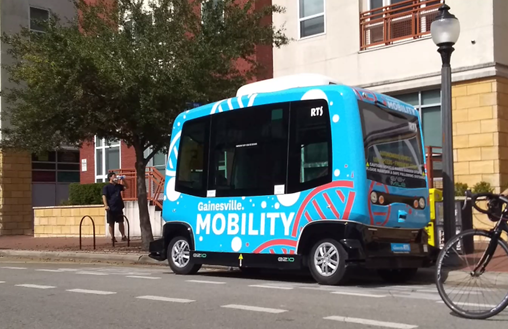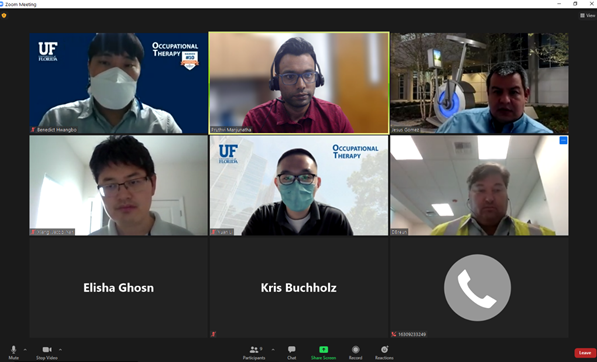
At STRIDE, researchers understand the value of working closely with stakeholders to ensure their research is relevant and applicable. A project led by University of Florida’s Dr. Sherrilene Classen, Professor and Chair of the Department of Occupational Therapy, exemplifies the importance and benefits of working closely with stakeholders. Dr. Classen leads a demonstration study “Older Driver Experiences with Autonomous Vehicle Technology” (STRIDE Project D2) which exposes older adults to autonomous driving both in a simulator and a real-life experience on an autonomous shuttle operating in the City of Gainesville, FL. Her research team has been working closely with three key stakeholders since the project’s conception: EasyMile, vehicle manufacturer, City of Gainesville (CoG) and Transdev, operator of the autonomous shuttle.
Meetings are open to all stakeholders
Dr. Sherrilene Classen, along with Dr. Justin Mason who is the co-PI of the project, note that the key to their success is weekly meetings that involve team members from all stakeholders with varying responsibilities and roles (i.e., graduate students to Vice President of Operations). After 2 years, their meetings now “run like a nightly talk show” with recurring stakeholders like Jesus Gomez from Gainesville RTS, Derrick Bruen, Elisha Ghosn , Jason Perez from Transdev, and UF researchers Seung Woo “Benedict” Hwangbo, Dr. Xiang “Jacob” Yan, Dr. Justin Mason, and Dr. Pruthvi Manjunatha. Others who periodically join the call include Emmanuel Posadas or Rob Schenck from the City of Gainesville, Dionysi Damaskopoulos and Kristin Buchholz from EasyMile, Dr. Tania Banerjee from UF Computer & Information Science & Engineering (CISE), and Louri Nemirovski from Siemens. Operators of the autonomous shuttle also provide important on-the-ground feedback based on their observations and conversations with riders.

Running from 10 to 30 minutes, researchers and stakeholders share updates, action items, and challenges during their meetings. Dr. Manjunatha, I-STREET Testbed Manager, believes that by communicating day-to-day issues that arise, they are able to “fine-tune their research process, ensuring it is practice-oriented.” Researchers are provided with real-time updates about traffic congestion, potential delays due to software updates, and changes to the route or shuttle schedule that can influence research. For example, when ridership on the shuttle dropped due to COVID-19, Transdev offered gift cards to participants for riding on the shuttle, which helped researchers collect more survey responses as a result.
By participating in this demonstration project, Transdev is able to observe the needs of riders and adapt their design to better meet the needs of users.
Stakeholders see the benefits too. The City of Gainesville receives updates from Transdev pertaining to ridership or suggested modifications from participants. Likewise, Transdev receives valued feedback from the City of Gainesville and University of Florida on how the shuttle is operating and how the design can be improved to better meet the needs of riders. For example, participants in a study funded by Paralyzed Veterans of America are living with a spinal cord injury or disease and their perceptions are collected before and after riding in the autonomous shuttle. Responses from these participants will provide information about the accessibility of these shared autonomous vehicles and inform acceptance trends for automated shuttles. The Easymile shuttle, which is built and designed in France, was not originally designed to meet the U.S. Americans with Disabilities Act (ADA) standards. By participating in this demonstration project, Transdev is able to observe the needs of riders and adapt their design to comply with the ADA so that the shuttle can be deployed throughout the U.S. in the future. With input from operators and researchers, Transdev remediated one vehicle in 2020 and is working on another vehicle this year.
Collaboration with Transdev and EasyMile also enabled the team to establish a data pipeline that automatically stores the shuttle’s data and videos on UF servers. This enables the team to study shuttle performance and impact on surrounding traffic effectively.
Dedicated stakeholders and researchers working together results in more streamlined and effective projects.
Researchers recall that stakeholder engagement was not always this easy. When the project started with Phase I in 2018, communication with stakeholders was disjointed, problematic and sparse. However, with a new, dedicated contact, meetings quickly became more streamlined and effective. Today, the researchers and stakeholders work closely toward common goals while supporting the needs of each, participant. One might even say that their collaboration is now on autopilot.